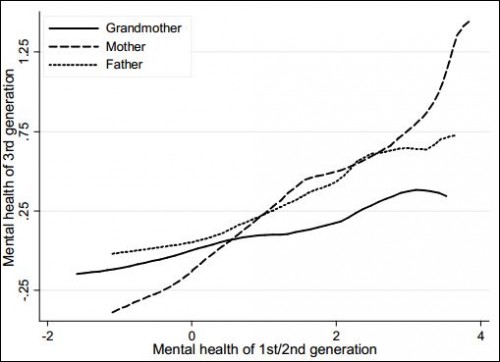In a paper forthcoming in the Journal of Health Economics, David Johnston, Stefanie Schurer, and Michael Shields explore intergenerational relationships of mental health. It’s positively correlated across not just one, but two generations.
Relationship between the Mental Health of Cohort Members’ Children (y-axis) and their Parents’ and Grandmothers’ Mental Health (x-axis)
The data on which the study is based are from the British Cohort Study (BCS), which surveyed people in born in England, Scotland, Wales, and Northern Ireland in 1970, 1975, 1980, 1986, 1996, 2000, 2004 and 2008. The mental health measure is based indices derived from responses to nine survey questions, rolled up into something fairly uninterpretable.
In all regression analyses we use mental health indices that are created by first averaging the nine responses in each year to create yearly mental health indices (1975, 1980 and 1986 for mothers, and 1996, 2000 and 2004 for children), and then averaging the indices across years. Given that these constructed mental health indices have no easily interpretable units, we further standardise them such that each has a mean of zero and a standard deviation of one, with larger values signifying worse mental health.
The authors explain:
[W]e estimate an intergenerational correlation coefficient in mental health of 0.190, which means that a one-standard-deviation decrease in maternal mental health (measured when the cohort member was a child) is associated with a 0.19 standard deviation decrease in the child’s mental health some 20 years later. The size of this correlation coefficient is similar to the estimated intergenerational transmission of income [] and birth-weight []. Additionally controlling for at-birth health information, parental socioeconomic status, child health at age five and child cognitive test scores, reduces this correlation to 0.163. We also find evidence that this intergenerational correlation is about 30 percent larger for motherdaughter than for mother-son comparisons, and that the strength of the intergenerational correlation increases with the age at which the child was exposed to episodes of maternal mental health problems.
The long time horizon of the 1970 British Cohort Study allowed us not only to investigate the magnitude of the correlation coefficient of mental health problems across three generations (grandmother, parent, grandchild), but also to separate out the gender differences in this transmission. We estimate a strong and significant correlation coefficient of mental health problems between grandmothers and their grandchildren, where a one-standard-deviation increase in grandmother mental health is associated with a change in grandchild mental health of 0.09 standard deviations. This association persists even after controlling for a wide range of grandparental and parental health and socioeconomic characteristics, but disappears when controlling for the parent’s mental health. We also find that the intergenerational correlation in mental health is stronger through the maternal than the paternal line by about 50 percent.


